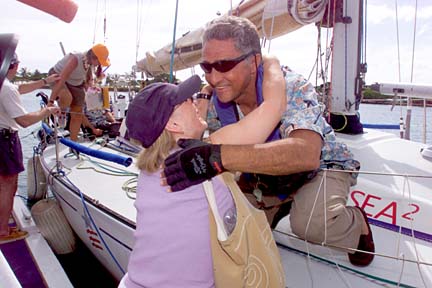
FL MORRIS / FMORRIS@STARBULLETIN.COM
B'Quest, a sailboat in the 42nd Transpacific Yacht Race crewed by disabled sailors, arrived yesterday at the Honolulu Yacht Club dock after finishing the race. Blind crewman Urban Miyares, right, was hugged and greeted by his wife, Joann, at dockside.
Disabilities don’t stop
boat crew’s finishThe brave crew of the B'Quest
completes the Transpac Yacht Race
Although they were not the first to cross the finish line in the Transpacific Yacht Race, the 40-foot sailboat B'Quest's crew received a winner's welcome at the Ala Wai Boat Harbor yesterday.
Five of the six members of the Challenged America Racing Team have severe physical disabilities, and they worked as one to complete the 2,225-nautical-mile, Los Angeles-to-Hawaii race.
B'Quest was bequeathed to Challenged America, a rehabilitation program in San Diego, in 1992 by a California couple.
"This has never been done in the history of the Transpac," said crewman Urban Miyares, a Vietnam War veteran who is blind, suffers from diabetes and kidney disease, and is hearing-impaired. Past participants have had disabilities, but never before has a predominantly disabled crew finished the race, Miyares said.
The crew was given no special concessions as one of the 61 yachts that left California on July 1.
"We had to qualify like everybody else," Miyares said.
The boat pulled into the Ala Wai Boat Harbor shortly after 4 p.m. yesterday to applause of Hawaii Yacht Club members, friends, family and students from the University of Hawaii Center on Disability. Although they finished fourth out of four in their class, other boats were still coming in, and it is difficult to assess how they came in overall.
The Center on Disability Studies, which is co-hosting the crew, will provide a dockside tour Saturday from 11 a.m. to 3 p.m. at the Ala Wai Boat Harbor for young people ages 5 to 21 to meet the crew and tour the specially equipped boat.
Crewman Scott Meide tied a bowline knot to the boat and secured the other end of the line to the dock, all with one hand.
During the Vietnam War, Meide lost his arm, broke both legs and lost some hearing and sight in one eye. He also survived cancer. Meide is probably the most mobile of the crew.
Each crewman did the work required. Miyares, though blind, took his turn at the helm and steered.
"When it's a black moonless night, they have me at the helm," he said. "I try to stay awake all night. I don't need a flashlight."
Sam Gloor, a quadriplegic with some use of his hands, moved around the deck on his bottom. Paralyzed midchest down, he took "quite a few spills," he said.
"We have to be connected more profoundly than a normal crew because we really depend upon each other," said crewman Bob Hettiger, a paraplegic.
Just 50 feet from the finish line, Hettiger said it hit him -- the dream he and Miyares had 12 years ago, which they were about to realize. All the experiences, the years of work, the two previous tries to qualify, flashed before him.
"It felt marvelous -- tears," he said. "It's just knowing you can do it. I thought we were pretty competitive. We didn't come in last."
�
